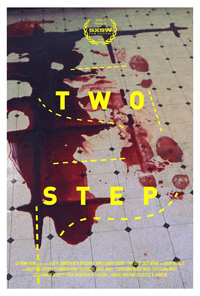Ordinary Madness: Johnson’s Character Study Enriched by Neo-Noir Aesthetic
 Premiering earlier this year at the SXSW Film Festival, Alex R. Johnson’s directorial debut Two Step is one of those surprisingly adept, slow burn gems that sometimes have trouble finding an audience outside of the festival circuit. Though it features several recognizable character actors, a mere plot synopsis can’t quite do justice to Johnson’s ambiguous title, which takes the concept of a simple dance move and makes it a surprisingly violent situational character study. Though it may ultimately prove too slight for some, and Johnson may not be reinventing the genre, it features enough unexpected moves to prove a heightened command of narrative and tone. At times, it even feels like he’s downplaying the capabilities of his two lead protagonists, and yet, it all seems entirely plausible.
Premiering earlier this year at the SXSW Film Festival, Alex R. Johnson’s directorial debut Two Step is one of those surprisingly adept, slow burn gems that sometimes have trouble finding an audience outside of the festival circuit. Though it features several recognizable character actors, a mere plot synopsis can’t quite do justice to Johnson’s ambiguous title, which takes the concept of a simple dance move and makes it a surprisingly violent situational character study. Though it may ultimately prove too slight for some, and Johnson may not be reinventing the genre, it features enough unexpected moves to prove a heightened command of narrative and tone. At times, it even feels like he’s downplaying the capabilities of his two lead protagonists, and yet, it all seems entirely plausible.
When his grandmother suddenly passes away, James (Skyy Moore) is wrestled out of his apathetic stupor. A college drop out with aimless intentions, he finds himself alone in a house he inherited along with a handsome chunk of money. He’s immediately distracted by the presence of Dot (Beth Broderick), a beautiful single woman who lives across the street. They strike up camaraderie and we learn she’s a retired ballerina cum dance instructor, single because she refuses to settle, keeping a married suitor at bay until he figures out what or who he really wants. Meanwhile, Webb (James Landry Hebert) is released from prison, and he calls on his girlfriend Amy (Ashley Spillers), who is surprised to see him released early. Amy and Webb had been involved in a scheme run by Duane (Jason Douglas), in which the pair would call senior citizens posing as relatives in need to fleece their cash. Except, while Webb was locked up, Amy decided to leave behind his violent tendencies and settle for Duane. Taking off with all the dough, Webb finds himself in a pickle since Duane still expects him to cough up the percentage he owes. And so Webb frantically tries to call upon his previous benefactors, one of whom was James’ grandmother.
Defined by its slick opening credits, Two Step does descend into chaotic moments of violence, but these moments are short, lethal outbursts, sometimes transpiring just outside the frame. Instead, there’s an omnipresent menace thanks to James Landry Hebert’s reptilian, overtly aggressive Webb, who looks every inch a nutritionally challenged vagabond whose sense of ambivalent style is stuck in last decade’s youthful memories. He easily walks away with the film’s most memorable sequences, but that’s no discredit to the fragility of the central relationship opening the film.
We don’t get as clear a sense of Skyy Moore as James, a college dropout who clearly has little common sense in vis-à-vis criminal contact. In fact, Johnson purposefully shuts down the character development in the face of the film’s violent turning point, but we’ve learned just enough to have gained a foothold of hope concerning James and Dot.
You’ve most likely seen Beth Broderick in any number of supporting film roles, or in notable turns in television series like “Sabrina, the Teenage Witch,” “Lost,” or recently “Under the Dome.” Here’s she’s a gracefully aging Southern Fried Beauty Queen, a last bastion of propriety, it would seem, in the handling of her current paramour, a cop whose marriage is on the fritz—except, she refuses to be the ‘other woman.’ If this subplot is less interesting, and sometimes at odds with the increasingly disquieting ordeal of James, it does provide an extended roll-out of tension as Johnson is playing with our expectations—is Dot going to realize something’s wrong in time?
Precise and effectively tense without resorting to overblown antics, Two Step is a likeable, adept first feature.
★★★/☆☆☆☆☆


